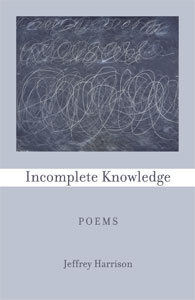
paper • 97 pages • 14.95
ISBN-13: 978-1-884800-73-3
INAUGURATION OF A HOUSE
Right away the ill omens begin:
the seller’s lawyer has a blood-stained eye.
Then a drunk driver knocks the mailbox down,
and I kill a snake in the basement,
its mottled body writhing on the slab.
All before we’ve even moved in.
Is this an initiation? We try to dispel any evil
by sprinkling kosher salt in all the corners,
then set to work to make the house
our own. All the old knob-and-tube wiring
is ripped out of the horsehair walls
and replaced with virgin Romex.
I spackle and repaint, bash my knuckles
lugging boxes in, struggle with molly
and toggle bolts, and pinch my thumb with pliers,
raising a blister as dark as a Concord grape.
The plumber gets our one toilet running
but warns, “She’s going to sweat like a pig.”
The house doesn’t begin to feel like ours
until we’re making love in it, on this bed
we had to dismantle to get upstairs,
and under this roof that needs repairs.
We’re trying not to think about that now,
making sure instead that this is good
for both of us, making it last,
tasting the wet salt on each other’s skin,
here among these boxes stacked
like sandbags against disaster or attack,
until these walls I’ve patched
absorb our cries and take us in.
“Determinedly affable, chatty and low-key even when his subjects are bleak, Harrison’s fourth volume stakes almost everything on the winning tone that pushes his almost prose-like, free verse poems. Often that gamble succeeds: viewing Manhattan on New Year’s Eve, 2000, Harrison (Feeding the Fire, 2001) muses, ‘I wish I could give you/ this pale blue city under the glass/ of a plane window like a snowglobe,’ the sweet wish barely ruffled by the specter of 9/11. ‘Fork’ recalls a decadeslong revenge against a malevolent writing teacher; ‘To Kenneth Koch’ elegizes a great one, while seasonal verse discusses baseball (‘Sometimes this is all it takes, moving a pile/ of screened loam’). These lighter subjects lead up to weighty poems about the poet’s brother’s suicide and his grandmother’s dementia, topics which together occupy perhaps a third of the volume, including the moving sequence ‘An Undertaking,’ which narrates the day-to-day aftermath of the brother’s death. These memoirlike poems have the bizarre details real grief always includes (the brother had ‘Enough socks/ for several lifetimes’), along with the sadness no verbal talent can assuage.” (Oct.) Copyright © Reed Business Information, a division of Reed Elsevier Inc. All rights reserved.
“A scribbly abstract expressionist painting adorns Harrison’s new collection, but don’t judge the book by it. Harrison’s poems aren’t abstract; they are full of definite actions, clear thoughts, and real things. They aren’t expressionist, either–never histrionic or formally eccentric. Their content comes out of Harrison’s own reasonably average life, but they are never just about Harrison. He is always eager to communicate what experiences mean to him and, he hopes, to you, who could easily have had their like. Driving with a friend to see Vermeers in Washington, visiting another friend in New York who’s become unemployably strange, and walking out to appreciate the world’s abundance despite knowing next to nothing, it seems, about it are typical of the experiences Harrison shares. He also relives, in the sequence that makes up the second half of the book, a rarer occurrence: living on after–and, really, with–a suicide in the family. Like a fine playwright, Harrison brings us into his experiences so artfully that we feel their weight and their truth as ours.” Ray Olson, Booklist Copyright © American Library Association. All rights reserved.
“The poems in Jeffrey Harrison’s new collection, Feeding the Fire, chronicle our growth from the cluelessness of childhood to that slightly greater state of awareness called adult life. . . . Harrison’s best poems. . . open doors to the place in the heart where we come closest to knowing who we really are.” —David Kirby, The New York Times Book Review
“It’s thrilling to read an entire book of poems written with such pleasure and gusto. Harrison writes with remarkable confidence . . . and he gets more out of his subjects than seems possible. How does he do this without ever being pretentious? He’s an artist.” —Philip Levine, Ploughshares
“There is no one else for whose poems—their tone and wording and overall approach to things—I feel greater sympathy and admiration.” —James Merrill